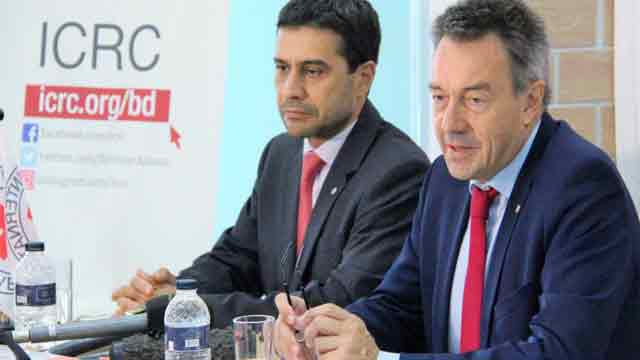Dhaka, July 3 (Just News): Red Cross President Peter Maurer said he has serious doubts over the conducive conditions in Myanmar’s Rakhine state for large repatriation of the Rohingya from Bangladesh.
“The conditions are simply not there for large numbers of people to return home,” he said at a press conference at the Dhaka office of the International Committee of the Red Cross (ICRC) today.
He made the remarks after a weeklong visit to Northern Rakhine of Myanmar and Rohingya refugee camps in Cox’s Bazar.
During the visit, he met Myanmar’s State Counsellor Aung San Suu Kyi, President U Win Myint, Senior General U Min Aung Hlaing and in Bangladesh he met Prime Minister Sheikh Hasia.
“Conditions to return will require not only humanitarian and mitigating activities, but also effective political steps towards ensuring freedom of movement; access to basic services; freedom to undertake economic activity and access to markets in Rakhine,” Peter Maurer told journalists.
“Most importantly trust in security arrangements for returnees,” he added.
However, Maurer said, he was convinced during his talks with the Myanmar leaders and officials that they have recognised the problem and have the political willingness to address it.
Over 700,000 Rohingya have escaped a brutal military crackdown since late August last year. Rohingya were reportedly killed, women raped and their houses burnt in the campaign, which was termed by the UN as textbook case of ethnic cleansing.
In Bangladesh, they joined over 300,000 other Rohingya, who fled previous waves of violence since 1980s in Myanmar, where they have been denied citizenship though they lived there for generations.
Those sheltering in the camps of Cox's Bazar live in shocking conditions that violate human dignity. With the monsoons arriving, their lives will only get worse. They cannot stay and they cannot return, he said.
“I cannot claim that life for those in Rakhine State is significantly better. In this remote, rarely-visited area, we drove through the areas where villages once stood. Little remains now, and the vegetation is rapidly reclaiming the land. In other parts, former schools and health centres stand empty,” the ICRC head said.
Describing the visit to one village, he said less than a quarter of the population remains there, only 2,000 of the original 9,000 villagers.
“I spoke with all communities - Muslim, Buddhist and Hindu. They described how the social fabric and local economy have been destroyed, making people entirely reliant on humanitarian aid.”
In Rakhine, he said, the villages have been destroyed and the economy is dysfunctional.
ICRC is doubling the distribution of food rations, to help communities during the monsoon season as many areas become inaccessible, Peter Maurer said.
“But humanitarian assistance alone will not solve this problem. A better future for the people here will need inclusive political solutions, environmentally sustainable economic investment and a strong commitment to international humanitarian law and human rights.”
(Justnews/ys/1310hr)





